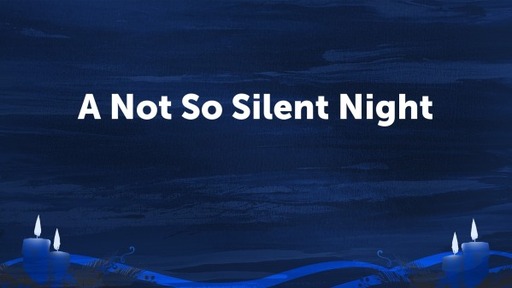A Not So Silent Night

Notes
Transcript
Sermon Tone Analysis
A
D
F
J
S
Emotion
A
C
T
Language
O
C
E
A
E
Social
Notes:
1. Historical Setting and Cultural Context, 2:1-6.
1. Historical Setting and Cultural Context, 2:1-6.
A. The Timing, 2:1-2.
A. The Timing, 2:1-2.
During reign of Caesar Augustus...
“But as for you, Bethlehem Ephrathah, Too little to be among the clans of Judah, From you One will go forth for Me to be ruler in Israel. His goings forth are from long ago, From the days of eternity.”
The Quirinius problem:
military mission in Syria during this time period. Also Herod’s increasing madness suggests that Caesar was poised to bring the region under direct Roman control.
Luke’s reference to this being the first census indicates that it probably was a separate census prior to the well-known census of AD 6.
B. The Issues Surrounding the Census, 2:3-6.
B. The Issues Surrounding the Census, 2:3-6.
Census Roman in origin, but most likely conducted by conscripted Jews according to Jewish customs, which would have included assembly by tribes and clans (Bock, Luke 1:1-9:50, page 905).
Bethlehem = House of Bread. Elev. 2,350, five to seven miles south of Jerusalem, a rural farming community, 90 miles S. of Nazareth.
Census brings throngs of David’s descendents as well as others from Bethlehem.
If Mary and Joseph intended to stay with family, they may have discovered the ancient home overrun with descendents of David. They may have anticipated going back to Nazareth sooner, but the census might have taken longer than planned, keeping them in Bethlehem until Mary’s pregnancy came to term.
2. The Birth of Jesus, 2:7.
2. The Birth of Jesus, 2:7.
The poor people of Jerusalem, culture of hospitality aside, could not house every traveler. Mary and Joseph sought out an “inn” (Katalyma), likely a temporary courtyard in the open-air. Could be cf. to a truck stop rather than a hotel.
Manger = feeding trough
The King of Kings is not born in a palace. He came to earth to save humanity by becoming human, and He brought hope to the lowly by becoming lowly.
3. The Proclamation of “Good News” and Its Impact, 2:8-20.
3. The Proclamation of “Good News” and Its Impact, 2:8-20.
A. The Angelic Messenger, 2:8–12.
A. The Angelic Messenger, 2:8–12.
The message from heaven came to lowly shepherds. By the 5th century AD, rabbinic writings see them as a despised class. Working with sheep all day and night would make one smell like sheep, offensive to the noses of the clean patrol of the temple.
These were looking for a Messiah in these evil times.
AN angel of the Lord brought the message of “good news” to those who needed it.
today
in the city of David
born to you (pl)
a Savior who is Christ the Lord (Messiah God)
wrapped in cloths and lying in a manger
B. The Angelic Hosts Celebrate, 2:13-14.
B. The Angelic Hosts Celebrate, 2:13-14.
Assembled angels represent the awesome power of heaven gathered for peaceful purpose.
By Leading, they show submission to the infant King.
They gave vertical praise to God and affirmed the horizontal effects of His grace
“with whom He is pleased” is a translation of one word (eudokia) which is notoriously difficult to translate. NIV captures the expression better: On whom His favor rests.
Based on no particular merit of our own, God delighted to grace humanity with a Savior.
C. The Impact on the Shepherds, 2:15-18.
C. The Impact on the Shepherds, 2:15-18.
They had received the greatest news humanity could have heard and responded immediately, setting off to find their Messiah.
D. The Impact on Mary, 2:19-20.
D. The Impact on Mary, 2:19-20.
Mary is left in reflection, still staring at her newborn child.
“treasured” - the Greek term means “to preserve,” “to guard,” or “to keep watch.”
“Pondering” - literally means “to bring together.” (like arranging the pieces of a jigsaw puzzle)
Mary worked on this puzzle for years in order to make sense of it all. Do not we do the same?
God had directed Luke to write something simple that would help us recognize His surprise gift. And there is much more in store for us to receive.
